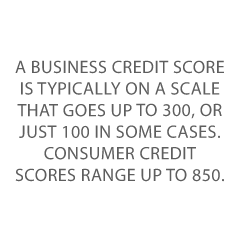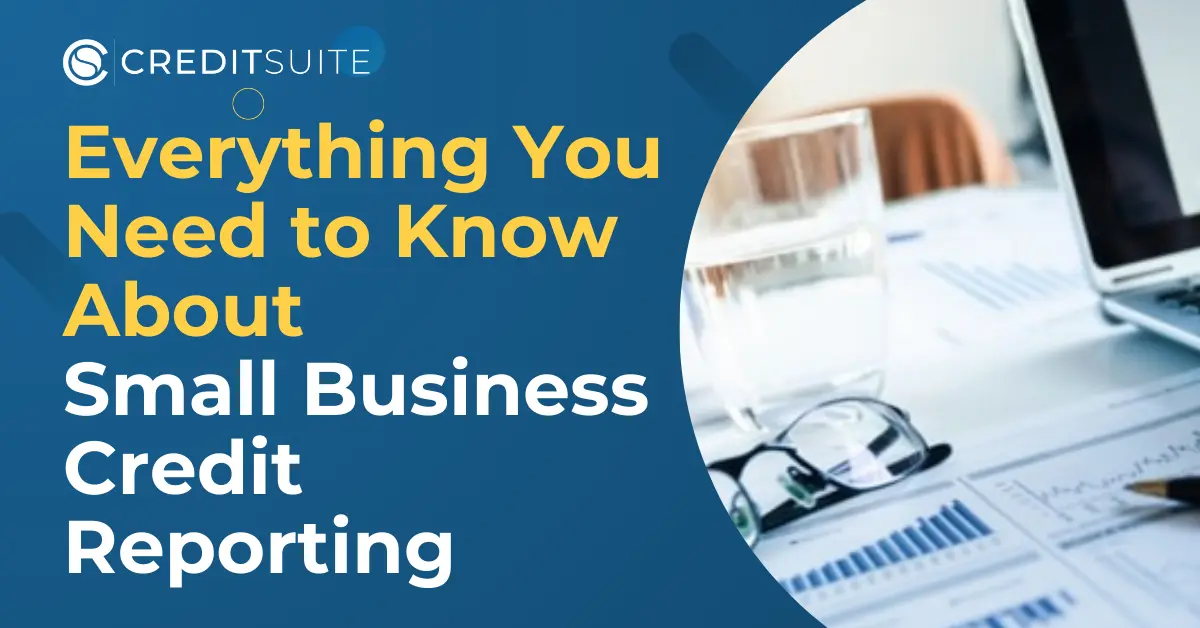This blog may contain affiliate links that might result in Credit Suite receiving a commission if you use them. This has no impact on the price you are charged for the product or service.
Business credit scores are similar to a personal credit score. In general, both scores offer lenders the same information. Yet, one is related to businesses rather than an individual.
There are plenty of other differences as well. From the way you establish and build each,to how the information is reported, there are almost as many differences as there are similarities.
Key Differences In Establishing a Business Credit File for Business Credit Reporting
The first difference is with the reporting agencies themselves. The three largest business credit reporting agencies are Dun & Bradstreet, Experian, and Equifax. Personal credit has TransUnion instead of Dun & Bradstreet.
Yet, perhaps the biggest difference is the way a business establishes a business credit file for accounts to report to the first place. Consumer credit reports happen passively. An individual gets a credit card and uses it. Then, those accounts report payments or lack of payment to the credit bureaus. At that point, the individual immediately has a credit report with a score.
In contrast, building business credit has to be intentional. It does not just happen. A business has to be set up properly with a Fundable™ Foundation. Then, it has to find credit accounts that will actually report payment activity. Sadly, not all of them do.
Different Information is Included on Business Credit Reports
Despite differences between agencies, most will offer similar basic information. For example, company information includes a company’s current name, address, owner names, and any key changes related to each of those.
With Business Credit Reporting, Data is Presented Differently
On business reports, business credit accounts show up by industry. The name of the company that issues the credit is not there. This is in contrast to how accounts show up on personal reports. Also, personal credit reports show the exact amounts owed on each account. Meanwhile, business credit shows rounded amounts.
The length of time data stays on a personal credit report varies. Typically, it is there for the life of the file. Some items like bankruptcies and foreclosures can come off after a few years in most cases. Yet, information stays on business credit reports for an average of 3 years.
There is also a difference in which vendors and lenders will report to the business credit agencies. Of course, with personal credit almost every account will report your payment history.
However, only about 7% of business credit accounts report on-time payments. Though, a lot of them will report a failure to pay.
This is why you must be intentional to get accounts reporting to your business credit profile if you want to build your business credit score.
Experian Business Credit Reporting
The main Experian score is the Intelliscore. In addition to basic business information and payment history, an Experian business credit report will include the following.
- Tradelines and UCC Filings
- Credit Summary
- Inquiry Information
- Collection Filings
- Business Relationships, Judgments, and Tax Lien Filings
There are various ways agencies calculate a business credit score. Surprisingly, the Intelliscore Plus uses over 800 factors to do so. They all fit into one of the following categories.
- Payment History
- Frequency
- Financial
There are other Experian business credit reports available. But, this is the one most commonly used by lenders.
Dun & Bradstreet Business Credit Reporting
Dun & Bradstreet is the oldest and largest of the main 3 credit bureaus. You need a D-U-N-S number to start building business credit with them. You can get one for free. Remember, it’s necessary to have this number to get your business into their system.
The main score is PAYDEX. Still, a business will not get a PAYDEX score until it has at least 3 trade lines reporting and a D-U-N-S number. Both are necessary to have a D&B score or report.
Generally, when D&B does not have all the information that they need, they will note it in their reports. Missing information does not necessarily mean a company is a bad risk. Rather, the risk is not known. They prefer objective and statistically derived data. sSubjective and intuitive judgments are not thought to be as useful. Their database contains millions of companies around the world.
PAYDEX Score
This is a dollar-weighted numerical rating of how well, or poorly, a company has paid the bills over the past 12 months. This score is based on trade experiences reported by various vendors. The range is from 1 to 100, with higher scores meaning a better payment performance. PAYDEX scores reflect how well a company pays its bills.
Other D&B Scores and Reports Include:
- PAYDEX Yearly Trend
- D&B Rating
- Financial Stress Class
- Credit Score Class
Equifax Business Credit Report Reporting
Equifax collects information similar to Dun and Bradstreet. That includes data from :
- public records
- the business itself
- creditors
This data is used in the calculation of various scores. That includes both the business credit risk score and the business failure score. The first measures how likely it is that a business will become 90 days or more delinquent on bills over the next year. It ranges from 101 to 992.
The second, ranges from 1,000 to 1610. It predicts how likely it is that the business will file for bankruptcy over the next year. A lower score indicates higher risk.
The business payment index is another Equifax calculation. This is their version of the Dun & Bradstreet PAYDEX. It even runs on the same scale of 0 to 100. It indicates payment history over the past year. You must reach a score of 90 or higher for it to be a good score, rather than the 80 benchmark of the PAYDEX.
How Does Score Calculation Differ With Business Credit Reporting?
There are a number of factors that affect a personal credit score, while the main factor in a business credit score calculation is payment history. Here are some key differences between the impact certain factors have on your business credit report.
Late Payments
Both your personal and business credit reportsreport are heavily impacted by late payments. In fact, a business credit report is affected even by this even faster than consumer credit. Typically, late payments do not get reported to a consumer credit agency for at least 30 days.
In contrast, payments are considered late on the business credit side when they are only one day past due. That means they affect your business credit score instantly, almost.
Inquiries
A hard credit check on your personal credit will lower your score. This doesn’t actually does not affect your business credit score at all.
Score Ranges
A business credit score is typically on a scale that goes up to 300, or just 100 in some cases. Consumer credit scores range up to 850.
What the Business Credit Scores Mean vs. Personal Credit Scores
While both are an indication of financial health, a business credit score is a mathematical model used to predict credit risk. It indicates a company’s creditworthiness. In this case, it represents a business’s risk of going 90 days late on an account within the next 12 months.
A consumer credit score is a mathematical model of credit risk also. Yet, it indicates the risk that a consumer will be 90 days late on an account within the next 24 months.
Perhaps the biggest difference is who can actually access and see your business credit report versus your personal report. Consumer credit falls under the Fair Credit Reporting Act. As a result, potential lenders must get permission from you before they can view your file.
However, anyone can view your business credit history. That includes customers, clients, and competitors. The truth is, others may use your business credit report, not just lenders. Insurance companies and other businesses can access and pull a business credit report as well.
Monitor Your Business Credit Score and Fix Your Business Credit Reports
It’s important to monitor your business credit reports for a number of reasons. All credit bureaus can make mistakes. If your report has incorrect credit information, it could be unnecessarily depressing your scores. You also need to know what your score actually is.
Since entrepreneurs are by definition busy, using credit monitoring is a smart idea. Still, the cost can add up fast.
That’s because unlike with consumer credit reports, you’re not entitled to an annual free credit report on your business. Furthermore, there are not really any options for free business credit score monitoring like you have for personal credit scores.
You have to pay, and the cost can start as high asnd $50 for just one peek at your report and go up from there. At Credit Suite, you can monitor your reports with all three of the main agencies for a fraction of the cost, and you can keep up with it monthly.
How Will Lenders and Other Agencies Use a Business Credit Report?
The key information most of these entities want to know is whether or not you will pay financial obligations. What’s the risk of your business not making a payment? They want to know if your business is a credit risk.
In short, anyone looking at your business credit report is likely trying to determine creditworthiness of the business. Lenders want to know if you will pay them back.
Insurance may check your business reports as well. Your business credit score can affect your insurance premiums.
Competitors may want to get an idea of the financial stability of your business. You can learn a lot about a company from their credit report, or even just their credit score.
Get Help Building a Solid Business Credit Report and Strong Business Credit Scores
Business credit reporting is a real thing. You need to have a strong credit report for your business, period. However, it is necessary to understand all you can about business credit reporting and your business credit scores. For example, you need to know how to establish the credit report in the first place. Then, you need to realize exactly what someone using your business credit report is looking for.
If you do not understand what factors impact your credit score, you could sink it without ever knowing. Also, if you don’t monitor your business credit scores, you may never realize that is what is blocking you from getting funding.
Credit Suite understands all of this. We can help you not only access business credit reports, but also set up your business credit profile and build your business credit score in the most effective and efficient way possible.


